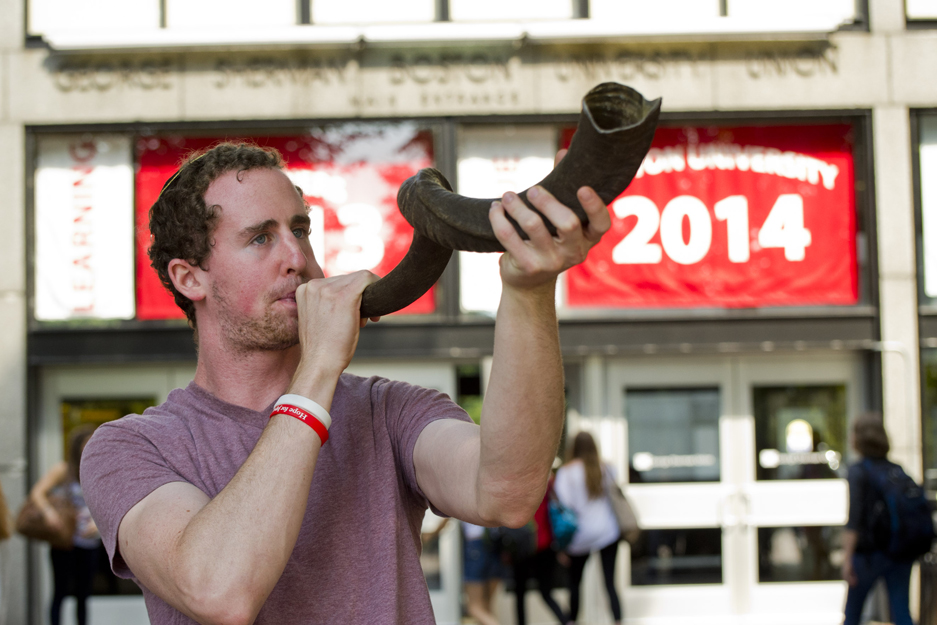Hillel Casts Wide Rosh Hashanah Welcome
New associate director reaches out to all faiths

Ben Fishman (CAS’14) prepared for the Jewish High Holidays last year by blowing a shofar (ram’s horn), which is traditionally blown at synagogue services on Rosh Hashanah and Yom Kippur. Photo by Kalman Zabarsky
You don’t have to be Jewish to embrace the spirit of Rosh Hashanah. As the new associate director of Hillel House, Rabbi Michael Beyo is extending a welcome to BU students of all religions, or no religion, to join in the center’s services and enjoy its events, including celebrating the High Holy Days, which are marked by universal themes of repentance and renewal.
Today is the first day of Rosh Hashanah, the two-day celebration of the Jewish New Year (5773 on the Hebrew calendar), which began yesterday at sundown. BU’s Florence & Chafetz Hillel House will hold services today and tomorrow. Rosh Hashanah marks the beginning of the 10 Days of Awe, a period of repentance and introspection culminating in the fasting holiday Yom Kippur, which begins at sundown on September 25. (High Holy Days services at Hillel are free to students, but preregistration is required.)
“I want to make sure that the services Hillel is providing are not only geared toward Jews,” says Beyo, who embodies globalism, having been born in Milan, Italy, to a Turkish father and an Italian mother of Polish-Austrian descent.
Beyo will take over as acting Hillel director this spring, when Rabbi Joseph Polak (Hon.’95), who has served BU for more than four decades, will be on sabbatical. The recipient of three rabbinical ordinations, as well as graduate degrees in Jewish history and political science, Beyo has written two books on bioethics and Jewish law and is a scholar of the 13th-century philosopher Moses Maimonides’ The Guide for the Perplexed.
Beyo and his family arrived in Boston at the end of July, and the rabbi began meeting with student groups and the University chaplains soon after they settled in. He brings with him a strong belief in inclusiveness and interfaith dialogue. “We are the house for the Jewish students, but I want to make sure that in no way will we put up a stumbling block for a student of any faith, or nonfaith,” to use our facility, he says.

Beyo says that Rosh Hashanah, Hebrew for “head of the year,” and the ensuing Days of Awe bear potential meaning for all religions and cultures. “It’s a message of introspection,” he says. “It’s not about us going to God and saying, ‘Please forgive me.’ It’s about us looking inside ourselves, to make ourselves better, to regenerate and rejuvenate ourselves.” This is what Beyo sees as “the real essence of repentance.”
But “to do that every day is difficult,” he adds, “so Jewish tradition says that we do this at least once a year.” Still, that continuing level of introspection and awareness is what everyone should strive for, he believes. “We should strive to be in a situation where we can look at ourselves every day and say, ‘I’m going to make myself a better human being.’” Both the High Holy Days, Rosh Hashanah and Yom Kippur, the Day of Atonement, “are just a reminder that we have to better ourselves,” he says.
Beyo comes to Boston from a stint as a lecturer at Georgia Institute of Technology, where he taught intra-Israeli conflicts and Israeli social movements. His multicultural endeavors include a partnership in a solar and wind renewable energy company, with projects in the United States, Italy, and Israel.
With roots in both the Ashkenazim (Jews with roots in Germany and Eastern Europe) and Sephardim (Jews with roots in Spain, Portugal, North Africa, and the Middle East), Beyo hopes to initiate Sephardic as well as Ashkenazi services at BU, where he has already encountered a group of Sephardic students from Panama. The services have different prayer melodies, Hebrew dialects, and traditional foods.
Beyo has lived in many countries, including France and Israel, where he served in the Defense Forces counterintelligence unit. It was during his military service that he mastered a self-defense method called Krav Maga, which he plans to teach in workshops on campus. “It’s not a martial art; it’s all about self-defense,” he says of the scenario-based training, which is in some ways similar to the rape aggression defense (RAD) classes offered by the BU Police Department. “It’s a preparedness you can use against multiple attackers with or without weapons.”
Beyo is fluent in Italian, Hebrew, and Yiddish, and conversant in Spanish, but he is just learning the language of BU, meeting with students and professors. As he gets his bearings, one thing he is intent on is making sure “that the services we’re providing are not only geared to Jews. They must be geared to all students.”
High Holy Days services at Hillel House are free and open to the BU community. Registration is required. More information is here.
Comments & Discussion
Boston University moderates comments to facilitate an informed, substantive, civil conversation. Abusive, profane, self-promotional, misleading, incoherent or off-topic comments will be rejected. Moderators are staffed during regular business hours (EST) and can only accept comments written in English. Statistics or facts must include a citation or a link to the citation.